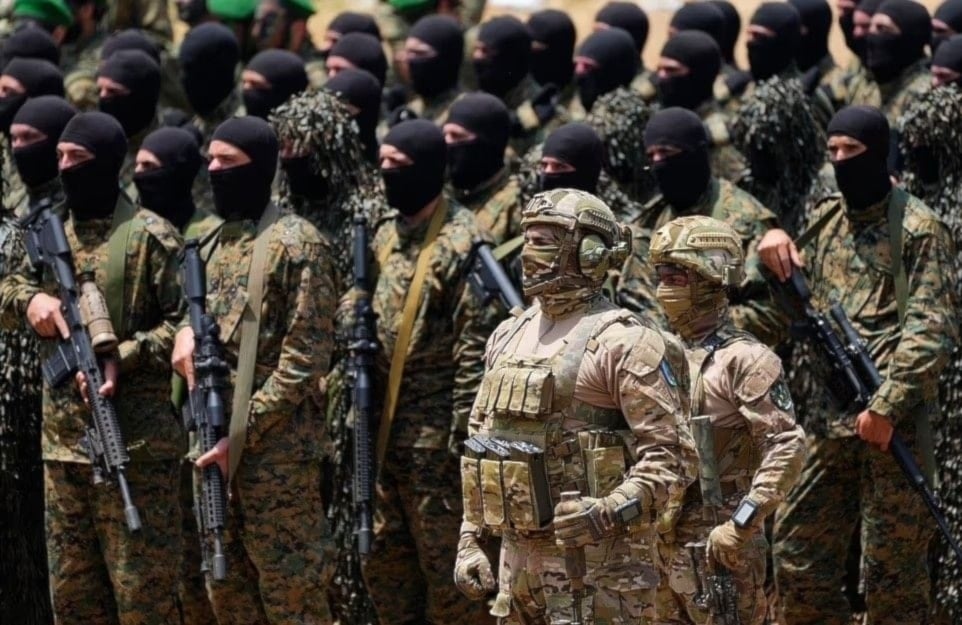With Radwan Force on border, we are 'sitting ducks': Israeli mayor
The mayor of the northern Israeli settlement of "Kiryat Shmona" has highlighted "Israel's" vulnerability in the face of Hezbollah's elite Radwan Force on the northern border.
-

Hezbollah Resistance fighters carry out a training exercise in Aaramta village in Jezzine, southern Lebanon, on Sunday, May 21, 2023 (AP)
The mayor of the northern Israeli settlement of "Kiryat Shmona" Avichai Stern said the Israelis are like "sitting ducks" with Hezbollah's elite Radwan Force on the border, Israeli media reported.
He further stressed that "as long as [Hezbollah's] Radwan Force is not removed by force and military action, nothing will change," adding that in every Israeli war, diplomatic and security agreements have proven ineffective and that the United Nations Resolution 1701 also failed to hold.
Elsewhere in his remarks, Stern emphasized that the Israeli settlers in the North "are well aware of this today... as we bear the repercussions of the failed agreement."
He further claimed, "It is evident that other agreements will also prove unsuccessful because we cannot put our trust in the enemy... they are not negotiating partners, and they cannot be deterred."
It is worth noting that Avichai Stern has repeatedly urged Israeli settlers not to return to the settlements in northern occupied Palestine. Stern stressed, in a message to said settlers, that they should not come back as long as the situation on the borders with Lebanon remains unchanged.
Israeli media have repeatedly stressed that northern settlements have been emptied of Israeli settlers, noting that it is doubtful whether the settlers will be able to return to the area within a year or more.
Hellfire to rain down on 'Israel'
A three-year study conducted by hundreds of experts at the Counter-Terrorism Policy Institute at Reichman University highlighted that chaos is expected to escalate within the Israeli occupation as Hezbollah prepares to send hundreds of fighters from the Radwan force into Israeli settlements in case an all-out war breaks out. Their primary objective would be to gain control of settlements along the occupied Palestinian border with Lebanon and strategic military sites in the North, as per the study.
This would force the Israeli army to divert its efforts from immediate operations in Lebanon, engaging in ground maneuvers to counter the imminent threat.
Internally, the Israeli settlers are anticipated to face challenges in receiving updated and reliable information about the unfolding situation, leading to a loss of trust in messages relayed by official sources.
The potential for panic and fear is expected to intensify due to the expected significant number of casualties, extensive damage, disruptions in power and water supply, delays in the arrival of rescue and relief forces, and difficulties in obtaining essential services such as food and medicine.
Hezbollah plans to exacerbate panic and confusion through continuous psychological warfare, flooding the media and social networks with threats and information that deepen internal divisions. Additionally, those seeking to escape from occupied Palestine may discover that the country's air links with the world have been severed, as per the report.
The assumption that an intensive Israeli attack on strategically important properties in Lebanon will force Hezbollah to cease fire is also expected to be proven wrong, the report added.
Hezbollah will not be alone in this battle, as the report warns of involvement from movements across the region. Resistance factions in Syria and Iraq, Hamas and the Palestinian Islamic Jihad in Gaza, as well as Ansar Allah in Yemen, are expected to contribute to what the report describes as a "violent and extensive upheaval."
The upheaval in question will include disruptions in the occupied West Bank and among Palestinians of '48, with rioting in mixed cities, challenges in war perception for the public, and the lowering of expectations from the army and rescue forces.
The report concludes by outlining vulnerabilities and pinpointing weaknesses in the Israeli occupation forces and settler communities. It challenges the expectations of the public and a significant portion of the leadership, stating that the effective Israeli Air Force and intelligence formations might not prevent the majority of missile strikes from reaching occupied Palestinian territories.
Similarly, the assumption that extensive attacks on strategically important properties in Lebanon would force Hezbollah to cease fire is expected to be inaccurate.
Read more: War with Hezbollah to be 'Israel's' deadliest: 130-page Israeli report

 4 Min Read
4 Min Read








